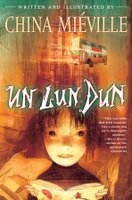 I so wanted to love this book. And I so wish I were 12 — maybe then it'd be a little easier. As it is, I found it very easy to walk away from this book for hours, even days, at a time.
I so wanted to love this book. And I so wish I were 12 — maybe then it'd be a little easier. As it is, I found it very easy to walk away from this book for hours, even days, at a time.China Miéville wrote Un Lun Dun for young adults. The title comes from the name of a city in an alternate reality, which a couple kids slip into. Un Lun Dun. Un-London.
Miéville in a recent interview describes the book thusly:
It's a classic story of children from our world who find their way into another, odder place. The place is sort of a twisted city. It's a homage to that tradition of books like the Alice books, the Narnia books — cross-fertilised with the urban tradition of books like Michael de Larrabeiti's Borribles.
Un Lun Dun has a decidedly urban feel. The dialogue is modern and slangy (there's a glossary for the benefit of American readers); as an adult reader I find this off-putting — the story loses the sense of fabular timelessness I associate with YA lit — but the tone at least is even and consistent throughout the whole of the novel. The world is littered with clever ideas of characters, but none are fleshed out. The plot is nothing new: youngster trapped in another world in accordance with prophecy must battle a villain before finding her way home.
Miéville talks a lot about breaking the conventions of the fantasy genre, but for some reason didn't see fit to do it here. It is a classic story. The prophecies are flawed, but this is a mere joke, not an overturning of the narrative formula.
(One character spouts out Humpty Dumpty's old line, that words mean whatever he wants them to mean. I love that Deeba argues back.)
The villain is a sentient gaseous cloud: Smog. Smog was apparently previously battled and beaten in London by the Klinneract. Deeba does some research and digs up the Clean Air Act. I half hoped, half dreaded that Miéville might get political, impart on young readers some lesson regarding the environment. But no, just a little joke.
Everything about this book feels like a missed opportunity, a thin sketch. I'm not well versed in young adult literature, so I can't fairly gauge how it measures up against what the kids are reading these days (although I can with certainty say this no Narnia or Hogwarts). I'd been hoping for a scaled-down version of Bas-Lag (I really wouldn't want to take a child there, even if I do let my 4-year-old watch Doctor Who with me), something less monstrous but as richly peopled. This isn't it.
There are moments when the darker, more adult Miéville shines through, with evidence of things for which I love the Bas-Lag books, when describing, for example, architecture:
They were swaying before a huge building. It was like nothing she had ever seen.
It had no straight edges, was all long curving planes stretched like cloth or rubber. In several places it poked into steep cones, and pillars and jags like tree branches jutted from beneath its shimmering, moving surface. It looked like a load of giant tents, all stitched together at crazy random, as big as a stadium. Its entire surface was white, or gray-white, or yellow-white, and it rippled.
"Oh my gosh," whispered Deeba again. "It's a cobweb."
Tons of spider silk had been draped over an enormous irregular framework. It coated it completely, in layers, totally opaque. At its edges, strands of webbing jutted out at angles and anchored to the pavement and surrounding buildings like guyropes.
In one or two places, Deeba could see dark, immobile things smothered in the silk. It was wound around them in shrouds, suspending them in the building's substance.
"That'll be Webminster Abbey, then," said Hemi.
or monsters:
Through the Diss & Rosa's windshield, Deeba saw fingers of weed rise from the murk and stroke the underside of the metal. Deeba put her face close to the glass to watch them, then sat hurriedly back.
"It moved," she said.
The stuff floated around them. If drifted by in little islands. As Deeba watched it, one quivered, and reached out a tendril to grab a passing piece of rubbish. It hauled it in — it was a mouldy fish carcass — and the slimy clot of weed quivered more.
"That's shudderwrack," said Lectern. "Keep you hands out of the water."
But these atmospheric gems are few and far between.
Interestingly, of all the books I've handled recently, Helena is particularly attracted to this one. She loves the jacket design. She found the illustrations within, Miéville's own, to be very funny. So there's something to it, the book having an appeal to a younger crowd. (Helena insisted I start at the beginning with her, not to read, but to count the chapters.)
See Edward Champion's review.
Excerpt.


1 comment:
It is so coincidental that you wrote about children's books tonight, and I did, as well!
I love children's books, I really do, but this one you are reviewing [overall] sounds not too good, I guess. Yet your daughter loves it. GO FIGURE!
Marketing!
This evening, I found myself looking over the books in the children's section of my Chapters store, and I felt as though there are SO MANY great books out there for "yoots" [as Joe Pesci, in the movie My Cousin Vinny would call them]!
It made me wish I were young again.
Do you like The Wind in the Willows, and the William Horwood sequels? [I think the whole series is awesome!]
sincerely,
A 43-year old kid.
Post a Comment